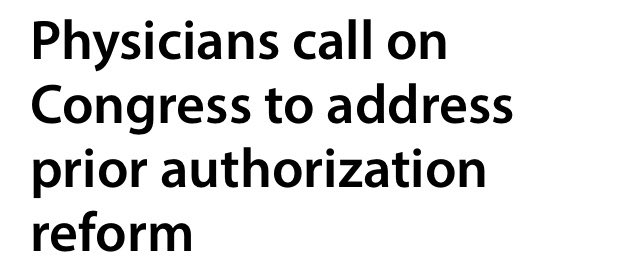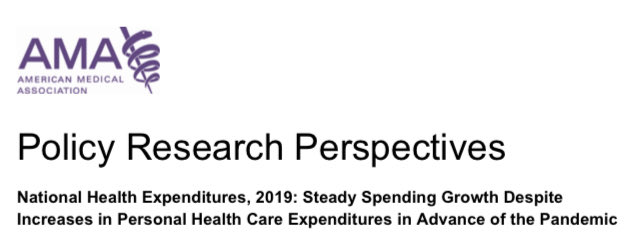
🧵#OurAMA issues initial summary of “Interim Final Rule (Part 1) Implementing Certain Provisions of the #NoSurprisesAct.”
Several initial concerns:
•Way the QPA (median contracted rate) will be determined
•Provisions that ⬆️ admin burden for physicians without patient benefit
Several initial concerns:
•Way the QPA (median contracted rate) will be determined
•Provisions that ⬆️ admin burden for physicians without patient benefit

2/ July 1 @HHSGov @USDOL @USTreasury (Tri-Agencies), @USOPM released an IFR with comment period tinyurl.com/smenwxk4 implementing many provisions of the #NoSurprisesAct signed into law as part of the Consolidated Appropriations Act, 2021 COVID-19 relief bill.
3/ Given statutory timeframes required under the NSA & the pending implementation of most provisions by January 1, 2022, the Departments made the decision to issue an IFR.
As a result, the requirements outlined in the IFR are final & will become effective on September 13, 2021.
As a result, the requirements outlined in the IFR are final & will become effective on September 13, 2021.
4/ However, the Departments request comments on several aspects of the rule. The AMA will be responding by the September 7, 2021, comment period deadline.
The IFR states that this is the first of several regulations that the Departments will be issuing to implement the #NSA.
The IFR states that this is the first of several regulations that the Departments will be issuing to implement the #NSA.
5/ Expect to see regulations on:
•IDR process, price comparison tools, certain transparency requirements later this year.
•Insurance card requirements, continuity of care, provider network directions, prohibition on gag clauses) maybe 2022. (To see guidance in interim soon.)
•IDR process, price comparison tools, certain transparency requirements later this year.
•Insurance card requirements, continuity of care, provider network directions, prohibition on gag clauses) maybe 2022. (To see guidance in interim soon.)
6/ 👉 For a detailed summary by @AmerMedicalAssn of the #NSA IFR (Part 1), please see: tinyurl.com/4ak4b4c9
7/ IFR provides:
• ⬇️ likelihood plans will need to use data from outside, independent databases in determining how QPA is calculated. Done thru broad definitions of “markets,” “geographic regions,” allowing reliance on small data sets, benchmarking for “new service codes,” etc.
• ⬇️ likelihood plans will need to use data from outside, independent databases in determining how QPA is calculated. Done thru broad definitions of “markets,” “geographic regions,” allowing reliance on small data sets, benchmarking for “new service codes,” etc.
8/ IFR provides for:
• ⬇️ role of bonuses, risk sharing, penalties, other incentive-based & retrospective payments or payment adjustments in calc of QPA.
• Process by which a patient receives notice & potentially provides consent for OON care & forgo NSA financial protections
• ⬇️ role of bonuses, risk sharing, penalties, other incentive-based & retrospective payments or payment adjustments in calc of QPA.
• Process by which a patient receives notice & potentially provides consent for OON care & forgo NSA financial protections
9/ •IFR sets structure for interaction of state & fed surprise billing req’ts as state law preempts fed law when either a set payment amount or dispute resolution process is in place for state-regulated plans &, when applicable, self-funded ERISA plans that opt-in to state law.
10/IFR:
• Sets facilities/physicians/providers criteria to provide required disclosure to patients about state & federal balance billing protections.
• Broadens complaint processes for patients, physicians, plans.
• Reaffirms several patient protections for EM care, e.g. PLP.
• Sets facilities/physicians/providers criteria to provide required disclosure to patients about state & federal balance billing protections.
• Broadens complaint processes for patients, physicians, plans.
• Reaffirms several patient protections for EM care, e.g. PLP.
11/ AMA has several initial concerns about the way QPA will be determined.
& while the Dep’ts attempt to consolidate/standardize some administrative requirements on physicians, in other areas they ⬆️ them in ways that may not benefit patients but result in burdens on physicians.
& while the Dep’ts attempt to consolidate/standardize some administrative requirements on physicians, in other areas they ⬆️ them in ways that may not benefit patients but result in burdens on physicians.
12/ The @AmerMedicalAssn will provide detailed comments to the Departments upon a full analysis of the Interim Final Rule (Part 1) Implementing Certain Provisions of the No Surprises Act. Stay tuned.
• • •
Missing some Tweet in this thread? You can try to
force a refresh







